|
The most noticeable symptom
is difficulty remembering things

Memory - What is it?
Webster's defines memory as "The mental capacity
or faculty of retaining or recalling facts, events,
impressions or previous experiences." Scientists
still do not understand how memory works witnessed
by the numerous confusing categories and terms,
they usually divide it into three types -immediate,
recent and remote- based on time. Children and
young adults are often proud of their memories
while as adults we generally complain about ours.
Achievement in school and the work place is largely
dependent on the ability to memorize facts and
social success is tied to the ability to remember
names and faces. When we reach our forties things
change. Did you ever find yourself looking in the
closet but not knowing what you are looking for
only to remember what it was when you got back
to the kitchen? This is a normal consequence of
aging and usually only effects short-term memory
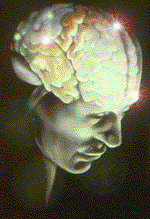
We all can forget some things on
occasion. If a person is very busy or has a lot
of problems their circuit board is just out of
whack for awhile until things are resolved. Also
being over-tired or stressed out over relationship
problems. Sleep deprivation is another reason (not
in a full REM sleep) so the person is walking around
like a zombie for days to weeks. In older people
(although young people have also been included
in this recently) it can be problems with thyroid,
adrenal gland or heart defects and in the elders
mini strokes.
Cognitive Decline Begins in Mid-Life
Whereas global life expectancy is on the
rise, the maintenance of cognitive health
becomes
a public health priority, since poor cognitive
status is considered a major disabling condition
in old age. Previous studies have established
an inverse association between age and cognitive
performance, with most studies suggesting
little cognitive decline occurs before the
age of
60. Archana Singh-Manoux, from Inserm (France),
and colleagues completed a large-scale prospective
study conducted over a 10-year period, utilizing
data from the Whitehall II cohort study involving
10,308 men and women, ages 45 to 70 years
the start of the study. Over the 10-year
study
time frame, each subject was evaluated for
memory, vocabulary, reasoning and verbal
fluency on three separate occasions. The
results showed
that cognitive performance (apart from the
vocabulary tests) declines with age and more
rapidly so as the individual's age increases.
The decline is significant in each age group.
For example, during the period studied, reasoning
scores decreased by 3.6 % for men aged between 45 and 49, and 9.6 % for those aged between
65 and 70. The corresponding figures for
women stood at 3.6% and 7.4% respectively.
The study
authors conclude that: "Cognitive decline
is already evident in middle age (age 45-49).”
Archana Singh-Manoux, Mika Kivimaki, M Maria
Glymour, Alexis Elbaz, Claudine Berr, Klaus
P Ebmeier, et al. “Timing of onset
of cognitive decline: results from Whitehall
II prospective cohort study.” BMJ 2012;344:d7622,
5 January 2012. Source |
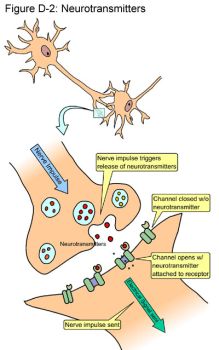
Definition: Cognitive Impairment Affects the ability
to think, concentrate, formulate ideas, reason
and remember. It is distinct from a learning disability
insofar as it may have been aquired later in life
as a result of an accident or illness.
Hello Barry,
It has been a little while since we spoke.
As you know after the brain trauma I suffered, I had a lot of trouble
with even simple sentences. After we spoke and after discussion with
my wife we went ahead and got the BTPlus.
We have seen big changes and so will continue t o use it every day. I
talk to other people who have the same type of injuries bout the improvements
I am getting. I encourage them all to work with one of these units.
Yours sincerely
Tom P London
Alpher, Elliott J., et. al. Traumatic
brain injury and full body reflex sympathetic
dystrophy patient treated with
cranial electrotherapy stimulation.
American Journal of Pain Management,
8(4):124-128, 1998. Presented at the
Ninth Annual Clinical Meeting of the
American Academy of Pain Management,
Atlanta, Georgia, September, 1998. |
Brain decline starts in 40s
Our brains start to deteriorate from as young as
45 - 15 years earlier than previously thought
- according
to a study.
Cognitive decline is a deterioration in cognitive
function. There is a normal process of age related
cognitive decline across the life-span characterised
by increasing difficulties with memory (new learning)
speed of infomation processing, language and other
cognitive functions. This normal process of age
related decline is often termed primary ageing
In the spring of 1977.
Tools had been discovered that were enabling
scientists
to penetrate the very interior of single
nerve cells in the brain. Important discoveries
were being made almost daily about the inner
workings of the brain. We now know that vital
chemicals carry messages between brain cells.
In essence, they allow brain cells to "talk
to" one another.
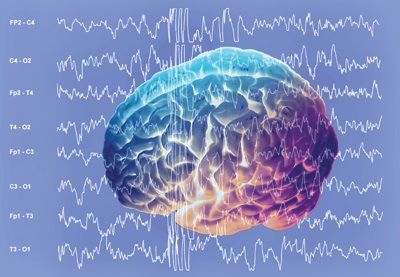
Alzheimer's , Dementia, and
the aging brain |
Efforts
to prevent dementia may need to start in adults
as young as 45 years."
When people over 65 show losses
in their short-term memory and comprehension, it’s
no surprise. But a new study claims that a general
cognitive decline starts to set in as early as
age 45. The research is in the British Medical
Journal.
Scientists tracked more than 5,000 men and 2,000
women, between ages 45 and 70, for 10 years starting
in 1997.
The study subjects were tested three times over
the 10 years, for memory, vocabulary and comprehension
skills. For instance, as a test of comprehension
they were asked to recall as many words and animal
names beginning with the letter “S” as
possible.
The participants’ scores went
down in all categories except vocabulary. Both
men and women
who were between 45 and 49 at the start of the
study experienced a 3.6 percent decline in mental
ability over the decade.
Christie Nicholson source
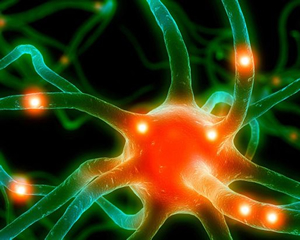
Do
you forget things ?
“Remember I asked you to remind me to call
someone?” “Yes.” “Who was
it?” “I forget
And: “What did I go to the kitchen for?” “How
do I know?” “You asked me to get it.” “Get
what?”
And: “I saw Whatsisname today.” “Who?” “You
know. Whatsisname.” “Oh. Where?”
If this sounds familiar, and if you ever complain
about your memory, join the crowd. There are millions
of us out here, complaining more about remembering
less. Memory specialists, say that forgetfulness
is the top health concern of baby boomers.
| Your time is limited, so don't wast it living
someone else's life. Don't be trapped by dogma-
which is living with the results of other people's
thinking. Don't let the noise of other's opinions
drown out your own inner voice. And most important,
have the courage to follow your heart and intuition.
They somehow already know what you truly want
to become. Everything else is secondary.- Steve
Jobs |
Cognitive
Decline Symptoms
With age, other conditions such as
stroke, dementia, delirium, brain tumors, chronic
alcohol use or abuse, substance abuse, some vitamin
deficiencies, and some chronic diseases may cause
cognitive impairment. Head injury and infection
of the brain or of the covering of the brain and
spinal cord (meninges) can cause cognitive impairment
at any age.
Your brain changes as you grow older just like
the rest of your body. Many people notice gradually
increasing forgetfulness as they age. It may take
longer to think of a word or to recall a person's
name.
But consistent or increasing concern about your
mental performance may suggest Mild cognitive impairment
(MCI). Cognitive issues may go beyond what's expected
and indicate possible
MCI if you experience any or all of the following:
 You
forget things more often. You
forget things more often.
 You forget important events such as appointments
or social engagements. You forget important events such as appointments
or social engagements.
 You lose your train of thought or the thread of
conversations, books or movies. You lose your train of thought or the thread of
conversations, books or movies.
 You feel increasingly overwhelmed by making decisions,
planning steps to accomplish a task or interpreting
instructions. You feel increasingly overwhelmed by making decisions,
planning steps to accomplish a task or interpreting
instructions.
 You start to have trouble finding your way around
familiar environments. You start to have trouble finding your way around
familiar environments.
 You become more impulsive or show increasingly
poor judgment. You become more impulsive or show increasingly
poor judgment.
 Your family and friends notice any of these changes. Your family and friends notice any of these changes.
 If
you have Mild cognitive impairment (MCI), you may
also experience: If
you have Mild cognitive impairment (MCI), you may
also experience:
 Depression Depression
What's 3 times better than Prozac?
CES was found to be two times more effective
in treating depression than the most effective
antidepressant drugs on the market. In fact,
CES treatment is 3 times as effective as
fluoxetine (Prozac) in the curing of depression,
compared to placebo (fake treatment).
- Gilula MF, Kirsch DF, Cranial Electrotherapy
Stimulation Review: A Safer Alternative to
Psychopharmaceuticals in the Treatment of Depression,
J Neurotherapy, 2005: 9(2), pp 7-26 |
 Irritability and aggression Irritability and aggression
 Anxiety Anxiety
82% of participants in one study suffering
from an anxiety disorder reported a significant
improvement in their symptoms after treatment
with CES.
- Kirsch D, Gilula MF, Electromedicine: CES
in the Treatment of Anxiety Disorders, Practical
Pain Management, March 2007, pp 40-47. |
 Apathy Apathy
source
One of the most common signs of Alzheimer's
is memory loss, especially forgetting recently
learned information. Others include forgetting
important dates or
events; asking for the same information over and over; relying on memory aides
(e.g., reminder notes or electronic devices) or family members for things they
used to handle on their own.
Could It Be Alzheimer's?
"If we have forgotten an appointment,
we begin thinking, 'Uh oh, is this the first
sign of Alzheimer's disease?' and we become
much more conscious, and it gets kind of
a disproportionate amount of attention when
it really may be something quite benign," Stuart
Zola, PhD
It's normal for our loved ones
to become a bit forgetful as they age. So how can we
separate a harmless "senior moment" from
a more serious problem like Alzheimer's disease?
One in eight people 65 and older have this
devastating form of dementia. In its first
stages, Alzheimer's may not be obvious to
friends and family. But there are some early
warning signs to watch for.
Slideshow: Alzheimer's Disease - A Caregiver's
Guide - Disorders
of the Brain |
Hi John here,
My wife and I want to pass on our thanks.
We have been using the BTPRO for sometime
now.
Although we always try to lead an active life both mentally and physically
and were notiCing that it was getting to be more of a struggle to focus
on the paperwork that we still need to do from time to time.
We found that with daily of BTPRO use this
is becoming less of an issue for us. Thank
you for talking to us and helping us to use
it to the
best advantage.
Catch up with you again
John and Betty F OR
FAQ
Everything you wanted to know about CES... |

Can my cognitive symptoms be helped?
Every computer's hard drive is organized.
The aim of loading information onto the hard drive
is not to leave it there, untouched and inaccessible,
but to use it. Much thought was put into how the
information will be filed away so that when it
is needed it can be accessed quickly and easily.
Your computer has a filing system to access all
information placed in any possible location.
What was the question again?
The majority of psychological
studies involving tDCS focus on the expansion
of knowledge about a certain region of
the brain or a certain psychological phenomenon.
For example, much work is done on the ability
and specifics of working memory.[12] Many
of these studies stimulate a particular
region of the brain and then observe the
effects of the stimulation in some type
of cognitive task.
Recently, there
have been studies that show that transcranial
direct current stimulation aids in the
working memory of cognitive tasks[13]
. More so, the United States Air Force
has shown interest in this area of research
as Andy McKinley[14] has showed that
tDCS can aid in training and teaching
cutting down time needed to train pilots.
As accuracy was sustained in trials lasting
up to 40 minutes compared to
the norm of 20 minutes |
Would you like
 Ability to Focus Ability to Focus
 Deep Relaxation Deep Relaxation
 Centering and Calmness Centering and Calmness
 Reduced Nervous Energy Reduced Nervous Energy
 Deeper, more Restful Sleep Deeper, more Restful Sleep
 Better Sexual Performance Better Sexual Performance
 Improved Mental Abilities Improved Mental Abilities
 Short Term Memory Improvement Short Term Memory Improvement
 Increased Mental and Physical Energy Increased Mental and Physical Energy
 Reduced Negative Behavior Patterns Reduced Negative Behavior Patterns
 Improved Attention Span and Concentration Improved Attention Span and Concentration
Note: the possible range of benefits
listed above are based upon years of experience
working with CES. Because there are currently no
published research studies involving the BTsystems
individual results will vary and must be considered
personal and subjective. Typically, individuals
will report a range of improvements - from very
substantial - to very little.

21st
Century Medicine & Learning
This response submitted by Ronald
B. Keys, JD, PhD .
Slow learners and, or, those with
impaired nervous system development may have their
brains and nervous system jumpstarted. Little did
we know back in the 1950s when the movie, Forbidden
Planet, with Leslie Nielson, Ann Francis and Walter
Pidgeon, that the Krell technology to stimulate
brain growth, with a form of cranial electrical
stimulation, might be in use in the 21st century.
currents.
| Beth was given anesthesia when she
gave birth to her first baby and later
found that she had lost part of her memory. She was forced to give up her job
in an aerospace plant. Years later a friend
gave
her a small cranial electrostimulation
(CES) device and she began using it. 'Almost
overnight,' she said, 'all my memories
started coming back, including everyone’s
telephone extensions at the plant. It was
uncanny—all these old extension numbers
of people I hadn’t thought of in
years.' This story, told to me by researcher
Bob Beck, Ph.D., provides graphic evidence
of a key fact: We have electric–powered
brains. Each of the billions of neurons
in our brains is a tiny electrical generator,
as complex as a small computer, firing
an electrical signal that triggers the
release of various neurochemicals and links
it with thousands of other neurons. |
Cranial electrical stimulation (CES)
may improve memory, attention and focus; important
studies are emerging on the uses of mild electrical
current to enhance cognition and aspects of intelligence.
Do you have to write everything
down or i forget it...
THE
BT Pro The most advanced CES unit ever produced
While inducing replenishment of general
deficiency states through direct oral supplementation,
particularly necessary substrates may be electroporated
into brain and nervous tissue via electroporation
through cranial electrical nerve stimulation, via
an electrical current. This is the equivalent,
by analogy, to putting the plug of a toaster into
an electric socket in order to toast the bread.
Now fortunately they had spent a
great deal of money in absolutely and
totally documenting the effects of this
little device. They found that it reversed
Korscoff psychosis (short term memory
loss) in three to five days with chronic
alcoholics. This work was done at the
University of Wisconsin Medical School,
the Louisiana Medical College and at
the University of Texas. Now any of you
who’ve dealt with alcoholism know
that it normally takes eight years for
the short-term memory to be restored—eight
years of total abstinence. The short-term
memory profile of an alcoholic absolutely
pinpoints the amount of degeneration.
One of the tests is the maze test, where
you have to go through a maze without
lifting the pencil from the paper. The
other is the beta section of the test
where you have to look at words on one
page, then the page is taken away and
you have to remember it on subsequent
pages. An alcoholic will usually show
a profile of almost total inability to
pass these two facets.
In all of their subjects, I don’t
like to say all, it’s rather
spooky, 99% of them—they were
able … where they had a baseline
of tests … for example, where
the person had been to college, had
taken this same or a similar test and
had become an alcoholic for 15 years … where
they had access to the original records,
the short-term memory was totally restored
in five days of using this little box
40 minutes a day. Now this is wild
and wonderful. All of this emerged
during some of the research. I spent
quite a bit of time in the bio-Ed library
of UCLA, some time at the Marris library,
USC County. |
For those of you that still
think this is voodoo medicine, do a google search
for electroporation, electropharmacology and
cell biomembrane transport. Also do a PUB MED
search for Saul Liss, PhD, to pull up actual
abstracts.
The
brain is a highly pliant, flexible organ that
has greater capacity than
we ever imagined.....
CES is a simple treatment employing
an electronic stimulation through clip-on electrodes
that attach to the earlobes. Current flow is user
controlled so that the most a user need experience
during the process is a tingling sensation. Its
most immediate impact is reduction of anxiety.
For most people, anxiety reduction is experienced
in the course of treatment, After a CES session
you are left feeling both alert and relaxed . Psychologists
call this an "alpha state". The effect
differs from pharmaceutical treatments in that
people report feeling that their bodies are lighter
and more relaxed and their mind more alert and
clear. The results are cumulative and often
lasting.
Studies at both Wisconsin and the
University of Louisiana showed it could boost
IQ from twenty to thirty points. Brain Tuners stimulation
appears to enhance neural efficiency," researchers
stated.
'Users report the BTuners reduces stress, improves
short and long term memory, helps learning, increases
energy, improves concentration and reduces pain,
anxiety, depression, and sleep requirements." Research
Papers

The Science Behind CES
"Many
studies have shown that low-level electrical
stimulation actually promotes
cell growth and regeneration.
A recent NIH study showed that low-level electrical stimulation of neurons increased
the production of the all important myelin cells
in the brain.
This could be an important discovery since myelin
is shown to be decreased in patients with certain
disorders and diseases, including bipolar disorder,
schizophrenia, and multiple sclerosis."
BT
Pro Multi system
 Full
LED screen Full
LED screen

 Built
in frequencies Built
in frequencies
 0.5
Hz 0.5
Hz
 1.5
Hz 1.5
Hz
 5.0
Hz 5.0
Hz
 7.83
Hz 7.83
Hz
 10
Hz 10
Hz
 100.00
Hz 100.00
Hz
 Plus
the Full BT6-BT11 Beck Protocol 1000.00
Hz + 111.00 Hz Plus
the Full BT6-BT11 Beck Protocol 1000.00
Hz + 111.00 Hz
 Over
500 Natural Harmonic frequencies Over
500 Natural Harmonic frequencies
 Fully
Rechargeable Batteries/Charger Fully
Rechargeable Batteries/Charger
 Timer
: 5 - 60 mins Timer
: 5 - 60 mins
 Intensity
Control Intensity
Control
 Very
portable Very
portable
 Instructions Instructions
 High
Quality Ear clips High
Quality Ear clips
 LCD
Screen LCD
Screen
|
BT
Pro Master
Unit
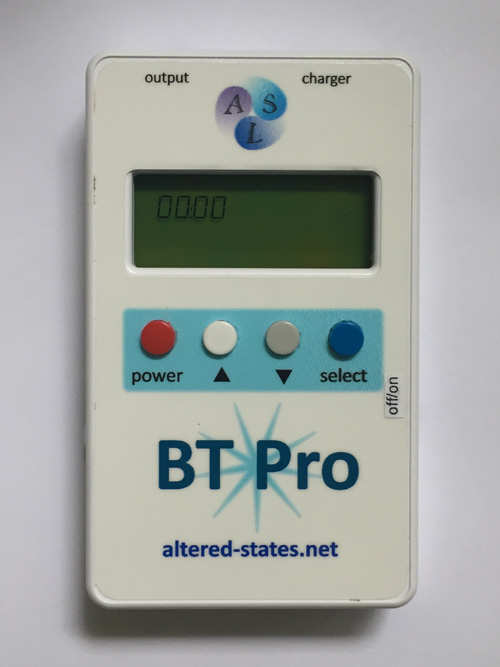
"Homeostasis can be
defined as the tendency for intrinsic balance
within a system. Application of a range
of CES appears to enhance the Balance of
the biological central nervous system.
A change in one system within the individual
will have correlative effects upon other
systems. Improvements in mood, cognitive
function, self image, shift of Focus ,
control to oneself, and sense of well being
can be measured. When CES works, it enhances
one's ability to handle or deal with situations
that were previously beyond the range of
one's control."
|
Option
Bio-feedback
There is a relationship between
Stress and the Electrical conductivity
of the skin. This is known as Galvanic
Skin Response or GSR. . More |
Free
Option allows one to measure GSR
Skin conducts electric current
like a Resistor. The resistance of Skin
can vary from 25 Kilo Ohms to 2 Mega Ohms
depending on the Emotional state (This
varies from person to person ).This variation
is due to the changes in the permeability
of the skin. In a normal fully relaxed
person, skin resistance will be around
2 Mega Ohms. This is due to the low permeability
of the skin. Skin offers high resistance
and restricts the current flow. But if
the same person is in stress, his skin
resistance reduces to 25 Kilo Ohms or less
due to leakage of water from the blood
vessels and subsequent sweating. This increases
the electrical conductivity of the skin.
Thus the electrical conductivity of the
skin and Stress are directly related
Bonus
with BT Pro Unit |
Additional
Add on Options.
|
Mind
Wave
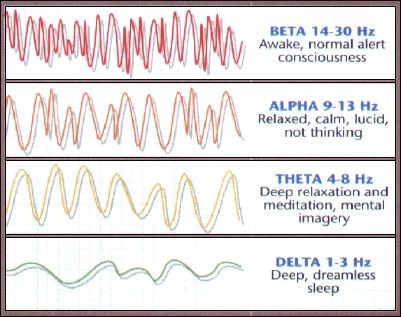
|
Unlocking
this Option gives you single frequencies
 Gamma 40
hz 50hz 60 hz 70 hz 80 hz Gamma 40
hz 50hz 60 hz 70 hz 80 hz
 Beta 14
hz 18hz 20hz 22hz 27hz 28hz 30hz Beta 14
hz 18hz 20hz 22hz 27hz 28hz 30hz
 Alpha 9
hz 10 hz 11 hz 12 hz 13 hz Alpha 9
hz 10 hz 11 hz 12 hz 13 hz
 Theta 4
nz 4.5 hz 5 hz 6 hz 7 hz 7.83
hz 8.0hz Theta 4
nz 4.5 hz 5 hz 6 hz 7 hz 7.83
hz 8.0hz
 Delta 0.5hz
1 hz 2 hz 3 hz 3.9 hz Delta 0.5hz
1 hz 2 hz 3 hz 3.9 hz
 Unlock
code Unlock
code
 Add
Mind Wave option Add
Mind Wave option
|
Click Here for More options to add to your BTPro |
BT
Plus Combination Alpha Theta Stim and BT9
Why The BT Plus is one of our
Most Popular units >>>More
Here
|
Its
An Alpha theta Stim and a BT11
all in one
5 Built in frequencies
 0.5
Hz 0.5
Hz
 1.5
Hz 1.5
Hz
 5.0
Hz 5.0
Hz
 7.83
Hz 7.83
Hz
 10
Hz 10
Hz
 100.00
Hz 100.00
Hz
 Plus
the Full BT6-BT11 Beck Protocol Plus
the Full BT6-BT11 Beck Protocol
 1000.00
Hz + 111.00 Hz 1000.00
Hz + 111.00 Hz
 Over
500 Harmonic
frequencies Over
500 Harmonic
frequencies
|
 Fully
Rechargeable Batteries Fully
Rechargeable Batteries
 Timer Timer
 Intensity
Control Intensity
Control
 Very
portable Very
portable
 High
Quality Ear clips High
Quality Ear clips
|
|
Now
you can turn your BT Plus into a tens
unit
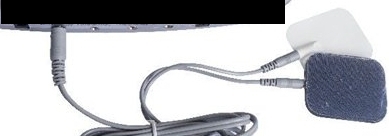
More
info Here
All
units are sold for Experimental
use |
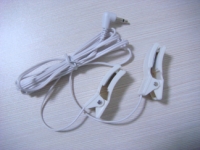 |
Extra
High Quality Ear clips
|
Seek immediate medical care (call 911)
for the sudden onset of cognitive impairment,
especially if it is accompanied by high
fever (higher than 101 degrees Fahrenheit),
neck stiffness or rigidity, rash, head
injury, changes in level of consciousness
or alertness, flushing or dry skin, severe
nausea and vomiting, fruity breath, or
other symptoms that cause you concern.
Seek prompt medical care for new onset
of cognitive impairment or if existing
impairment worsens |
References:
Van Dyke, Halpern, Busby, 'Space Biomagnetics' Space Life Sciences (1968).
Basset, Pawluch, NY Acad of Science (1974); Gross, Lawrence, FEd Proc (1961);
Kolin, Brill, Broberg, Biol & Med (1959); Degen, Vracdelo (1971); Freeman,
Magnetism in Medicine - Journal of Appl Physics (1960).
|

